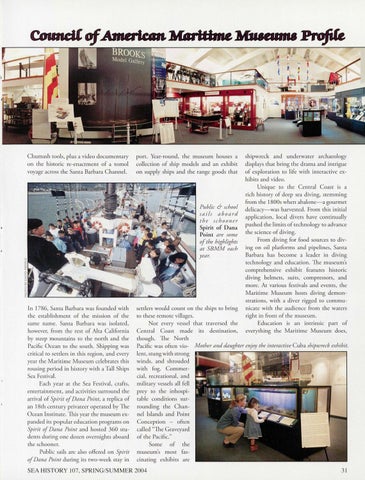Chumash tools, plus a video documentary on the historic re-enactment of a tomol voyage across the Santa Barbara Channel.
port. Year-round, the museum houses a collection of ship models and an exhibit on supply ships and the range goods that
Public & school sails aboard the sch oo ner Spirit of Dana Point are some of the highlights at SBMM each year.
In 1786, Santa Barbara was founded with the establishment of the mission of the same name. Santa Barbara was isolated, however, from rhe rest of Alta C alifornia by steep mountains to the north and the Pacific Ocean to the so uth. Shipping was critical to settlers in this region, and every year the Maritime Museum celebrates this rousing period in history with a Tall Ships Sea Festival . Each year at the Sea Festival, crafts, entertainment, and activities surround the arrival of Spirit of Dana Point, a replica of an 18th century privateer operated by The Ocean Institute. This year the museum expanded its popular education program s on Spirit of Dana Point and hosted 360 sn1dents durin g o ne dozen overnights aboard the schooner. Public sails are also offered on Spirit of Dana Point durin g its two-week stay in
shipwreck and underwater archaeology displays that bring the drama and intrigue of exploration to life with interactive exhibits and video. Unique to the Central Coast is a rich history of deep sea di ving, stemming from the 1800s when abalone-a gourmet delicacy-was harvested . From this initial application, local di ve rs have continually pushed the limits of technology to advance the science of diving. From diving for food sources to diving on oil platforms and pipelines, Santa Barbara has become a leader in diving technology and education. The museum's comprehensive exhibit features historic diving helmets, suits, compressors, and more. At various festivals and events, the Maritime Museum hosts diving demonstrations, with a diver rigged to communicate with the audience from the waters right in front of the museum . Education is a n intrinsic part of everything the Maritime Museum does,
settlers would count o n the ships to bring to these remote villages. No t every vessel that traversed the Central Coast made its destination, though. The No rth Pacific was often vio- Mother and daughter enjoy the interactive C uba shipwreck exhibit. lent, stung with strong winds, and shrouded with fo g. Commercial, recreational, and military vessels all fell prey to the inhospitable co nditions surrounding the C hannel Islands and Point Conception - often call ed "The Graveya rd of the Pacific." Some of the museum's most fascinating exhibits are
SEA HISTORY l 07 , SPRING/SUMMER 2004
31
